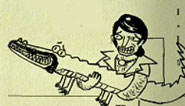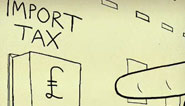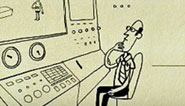Find out about The Open University's Economics courses.
Transcript: Much like a child getting his pocket money, one of the biggest economic questions is still whether it’s better to save or spend.
Free-marketeers like Hayek and Milton Friedman say that, even in difficult times, it's best to be thrifty and save.
Banks then channel the savings into investment, in new plants, skills and techniques that let us produce more. And even if this new technology destroys jobs, wages will drop, and businesses hire more people – so unemployment falls again.
Simple. At least in the long run... But then a "live-fast-die-young" kinda chap called John Maynard Keynes cheerfully pointed out that “in the long run we're all dead”.
So, to avoid the misery of unemployment, the government should instead spend money to create jobs.
Whereas if the government tightens its belt when people and businesses are doing the same, less is spent, so unemployment gets even worse. That is the paradox of thrift.
So instead they should spend now and tax later when everyone's happy to pay - Though making people happy to pay tax was something even Keynes didn't solve.
Got another 60 seconds?
-
60 second adventures in economics: The Invisible Hand
Watch now to access more details of 60 second adventures in economics: The Invisible HandIn the first of our six short videos on economic theory, watch how an Invisible Hand drives the economy. Eventually.

Video
Level: 1 Introductory
-
60 second adventures in economics: The Phillips Curve
Watch now to access more details of 60 second adventures in economics: The Phillips CurveBob Phillips took some time out of crocodile hunting to have a stab at explaining how wages, prices and unemployment interplay.

Video
Level: 1 Introductory
-
60 second adventures in economics: The Principle Of Comparative Advantage
Watch now to access more details of 60 second adventures in economics: The Principle Of Comparative AdvantageWhy do countries sign free trade agreements? It's not just because they get to keep the pens, but to try to take advantage of their comparative advantage.

Video
Level: 1 Introductory
-
60 second adventures in economics: The Impossible Trinity
Watch now to access more details of 60 second adventures in economics: The Impossible TrinityNations want it all - currency flows, low interest rates and stable exchange rates. Dream on, nations, you've got to choose.

Video
Level: 1 Introductory
-
60 second adventures in economics: Rational Choice Theory
Watch now to access more details of 60 second adventures in economics: Rational Choice TheoryPeople are pretty rational. But not quite rational enough for the good of the economy.

Video
Level: 1 Introductory
Got more than 60 seconds? Try these FREE courses...
-
Economics and the 2008 crisis: a Keynesian view
Learn more to access more details of Economics and the 2008 crisis: a Keynesian viewThis free course, Economics and the 2008 crisis: a Keynesian view, looks at how Keynes's theories revolutionised thinking about the causes of crises and unemployment. Keynes's thinking on how to reduce these problems was very influential with economists and policy makers for several decades following the 1930s. The economic downturn that started...

Free course
28 hours
Level: 2 Intermediate
-
Economics explains discrimination in the labour market
Learn more to access more details of Economics explains discrimination in the labour marketDiscrimination in the labour market exists in many forms: the 'glass ceiling', ageism, racism, and so on. This free course, Economics explains discrimination in the labour market, will help you look at this problem from a new perspective: through economics. You will learn how economists have tried to understand what drives this distortion of the...

Free course
8 hours
Level: 3 Advanced
-
Rent or buy? The challenge of access to housing
Learn more to access more details of Rent or buy? The challenge of access to housingEveryone needs a place they call home and housing costs are usually your largest outgoing. Many aspire to buy, but rising house prices, while good news for existing owners, put homeownership beyond the reach of others. This free course, Rent or buy? The challenge of access to housing, addresses some of the most important decisions that ...

Free course
8 hours
Level: 1 Introductory
Rate and Review
Rate this video
Review this video
Log into OpenLearn to leave reviews and join in the conversation.
Video reviews